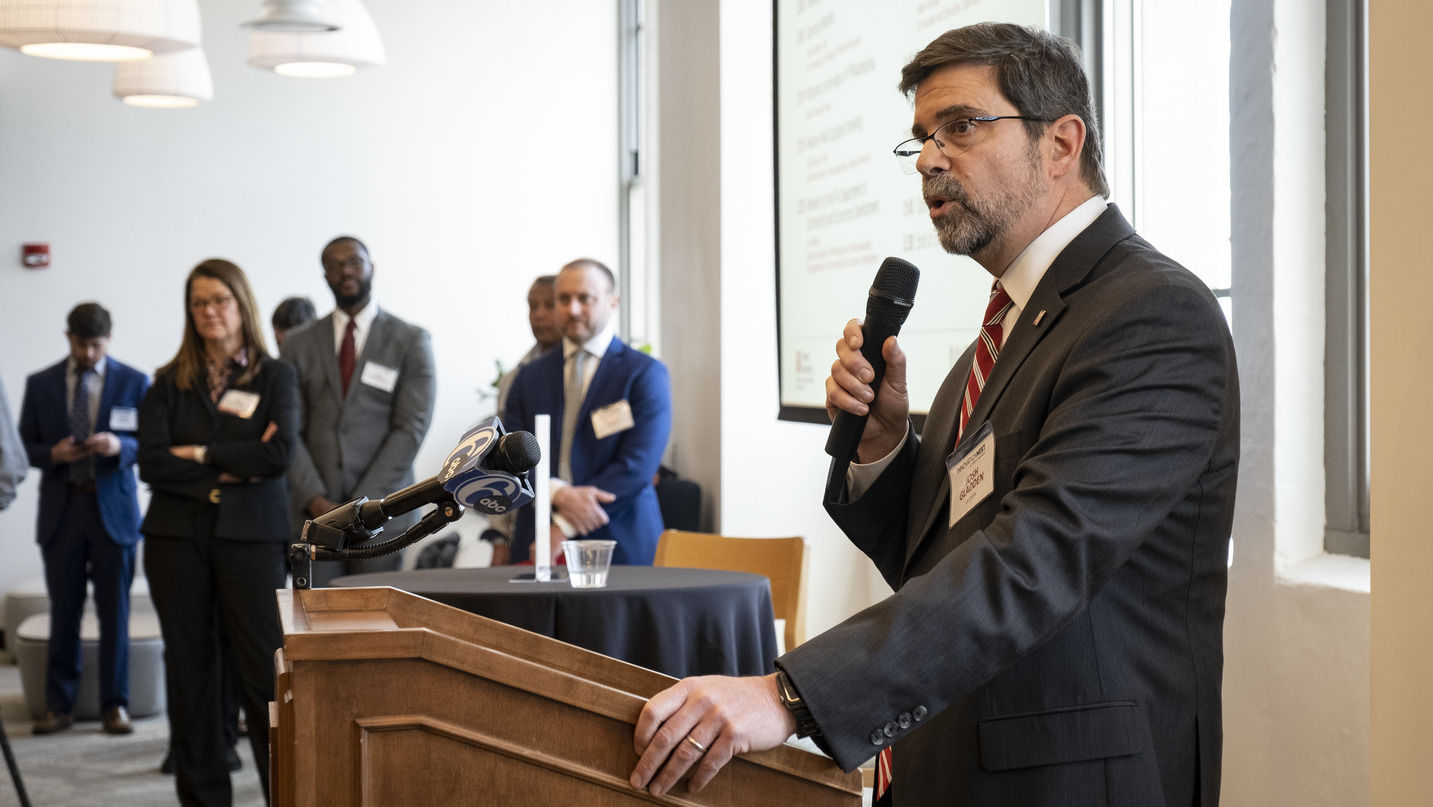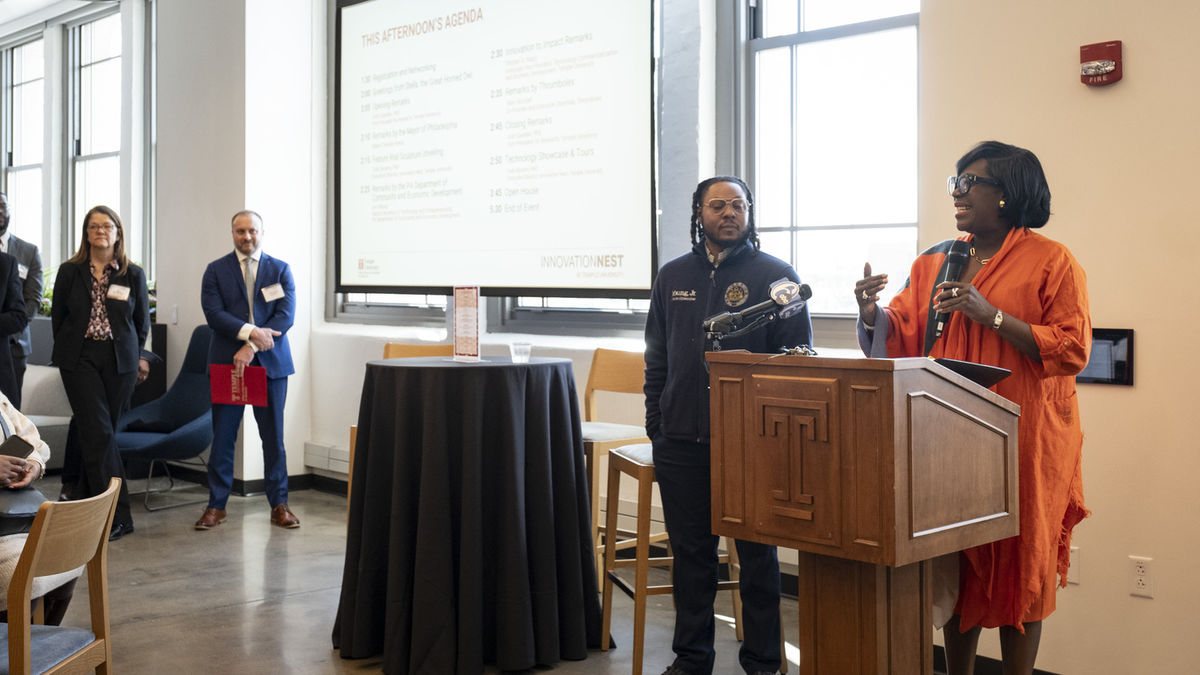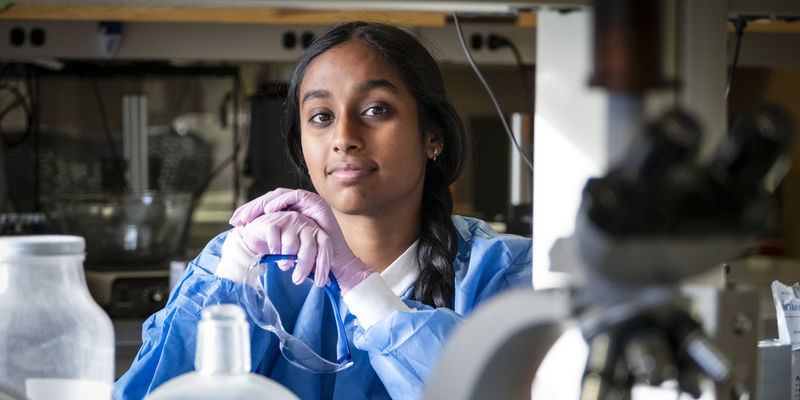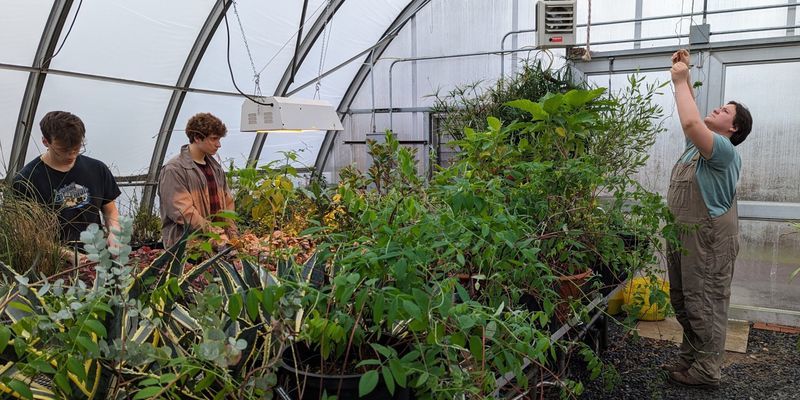Introducing Temple’s new hub for innovation
The Innovation Nest, aptly nicknamed the iNest, officially opened its doors on Tuesday, March 19, and is dedicated to commercializing new innovations from Temple researchers and spurring student innovation.

If you stand in the back conference room within Temple University’s Innovation Nest and look out the window, you will see a clear shot of Center City Philadelphia. That’s not by accident.
“That view is really a reminder of why we are here, and it is intentional that you can see downtown Philadelphia from this window. We are here to generate economic and social impact for Philadelphia,” said Josh Gladden, Temple’s vice president for research. “Temple has rapidly grown into a top-tier, research-driven institution, and that is exactly why we were elevated to the top classification of Carnegie Classification of Institutions of Higher Education back in 2016. However, since then, we have seen our research only further expand, and this will be the facility to support that research.”
Aptly nicknamed iNest, this new space officially opened its doors during a special grand opening event on Tuesday, March 19, and it is dedicated to commercializing new innovations from Temple researchers and spurring student innovation.
Elected officials were on hand for the grand opening event, including Philadelphia Mayor Cherelle Parker and Philadelphia Councilmember Jeffery Young Jr., and Jen Gilburg, deputy secretary of technology and entrepreneurship for the commonwealth of Pennsylvania, spoke during the event. President Richard Englert and Provost Gregory Mandel were also present at the open house, held after the grand opening.
“I am here to publicly (state) that our city promises to support and affirm these goals (of iNest) in any way we can,” said Mayor Parker during the event, which was attended by nearly 100 members of the Temple and Philadelphia communities. “Philadelphia, if we all work together, we can become the safest, cleanest, greenest big city in America. (iNest) fits into the vision. (iNest) fits into the goal.”

Philadelphia Mayor Cherelle Parker and Philadelphia Councilmember Jeffery Young Jr. were both in attendance at the opening of the iNest on Tuesday, March 19. (Photo by Joseph V. Labolito)
An initiative within Temple’s Office of the Vice President for Research, iNest’s beginnings can be traced back to 10 years ago. At the time, Temple had experienced a rise in research as, according to the Chronicle of Higher Education, the university is fourth in the nation among universities with the fastest growth in research for the past 10 years.
To help put this project in motion, the university secured grants from the Commonwealth of Pennsylvania Redevelopment Assistance Capital Program, the Commonwealth Universal Research Enhancement Program and the Sbarro Health Research Organization. In total, more than half of the funding for the project came from these grants.
Then, over the past several years, Temple’s Office of the Vice President for Research has worked diligently to determine the best path forward for commercializing new innovations from Temple researchers and spurring student innovation.
“The Innovation Nest was designed to create a gravitational field that draws in the innovation, industry and investment partners necessary to deliver Temple discoveries to our community, and in doing so, could spark the North Broad tech corridor,” said Steve Nappi, associate vice president for technology commercialization and business development within Temple’s Office of the Vice President for Research. “We are going to start here in our backyard of North Philadelphia, but we ultimately believe our impact will go beyond that.”
One of the most appealing aspects of the new iNest is that it essentially serves as a one-stop shop for startup companies and aspiring student innovators alike.
“Many of our technologies advance to create new companies, better known as ‘spinout companies,’ which raise the funding necessary to develop and bring those Temple discoveries to market,” said Todd Abrams, executive director of iNest. “With iNest, we have essentially made this process seamless as we have designed a ‘hub’ approach that connects all the stakeholders and startup elements together.”
There are three core components of iNest, including
- an internal, expanded Temple team that identifies and protects university discoveries and handles the partnership with startups and established businesses to further develop those discoveries.
- a collaborative forum that hosts events and delivers programs designed to connect the ecosystem of surrounding companies, entrepreneurs, investors and advisors to the Temple innovation community.
- an incubator designed to adapt to the dynamic reality that startup companies face, meaning that the spaces within iNest are adaptable to each company’s needs. For instance, there are presently two wet labs within iNest, and one has been adapted to be used by a product development company with novel manufacturing technology.
“Innovation rarely follows a straight line, and we wanted that dynamic, adaptive space throughout the facility,” Nappi said. “We didn’t want to overdesign because we didn’t want to box out any companies.”
Now open for business, the iNest can host up to 12 individual companies in its physical space, and also can serve other companies through a “flex” membership model where clients do not have their own dedicated space but can use shared facilities.
The opening of the iNest also comes at an opportune time. Late last year, Temple received its highest-ever ranking by the National Academy of Inventors’ Top 100 U.S. Universities list at 75. The Top 100 U.S. Universities List is an annual ranking created to highlight and celebrate U.S. universities that play a large role in advancing innovation and invention in the United States. In the past five years, Temple’s startup portfolio has also raised more than $257 million and supported $14 million in research funding during the same period.
To learn more about iNest or inquire about securing space within the facility, contact Abrams at todd.abrams@temple.edu or 215-204-8823.

